
The Supreme Court of India has agreed to hear a Public Interest Litigation (PIL) demanding a court-monitored investigation into the business activities of Anil Ambani's ADAG group. The petition alleges that current investigations into the conglomerate have been insufficient and deliberately excluded key individuals from scrutiny.
Details of the Petition
The petitioner has raised serious concerns about the scope of existing investigations, stating that the earlier proceedings of the FIR and the connected Enforcement Directorate (ED) cases cover only a fraction of the alleged wrongdoing. According to the petition filed, these investigations have intentionally left out the examination of bank officials, public servants, and regulatory authorities who may have played roles in the alleged fraud.
This development comes as the latest chapter in the ongoing scrutiny of Reliance Communications and other companies under the ADAG umbrella. The petitioner has pointed to what they describe as widespread fraud that requires a more comprehensive investigation under the Supreme Court's supervision.
Scope of Alleged Irregularities
The PIL suggests that the current investigations have failed to address the complete picture of financial irregularities within the ADAG group. The petitioner claims that excluding bank officials and regulators from the probe has resulted in an incomplete understanding of the alleged fraud's magnitude.
The case has been listed for hearing before the Supreme Court, marking a significant development in the legal challenges facing the business group led by Anil Ambani. The court's decision to entertain the PIL indicates the seriousness of the allegations and the need for judicial oversight in the matter.
Broader Implications
This case represents another legal hurdle for Anil Ambani, whose business empire has faced multiple challenges in recent years. The demand for a court-monitored investigation suggests that the petitioner believes existing investigative agencies have not been thorough enough in their examination of the alleged financial irregularities.
The Supreme Court's involvement could potentially lead to a more extensive probe that includes all parties allegedly involved in the suspected fraud. The outcome of this case could have significant implications for corporate governance and financial regulation in India, particularly regarding how investigations into alleged banking fraud are conducted.
As the matter progresses through India's highest court, stakeholders across the financial and corporate sectors will be watching closely. The court's decision on whether to order a court-monitored investigation could set important precedents for how similar cases are handled in the future.






